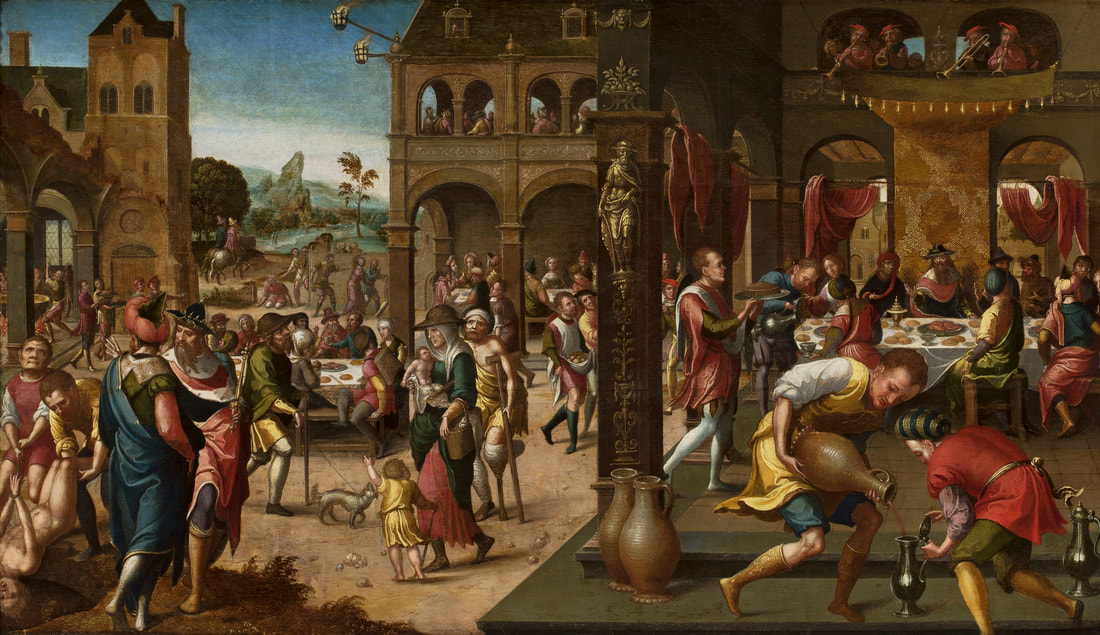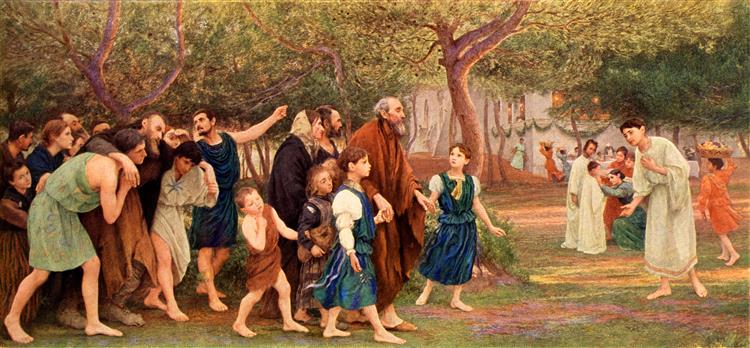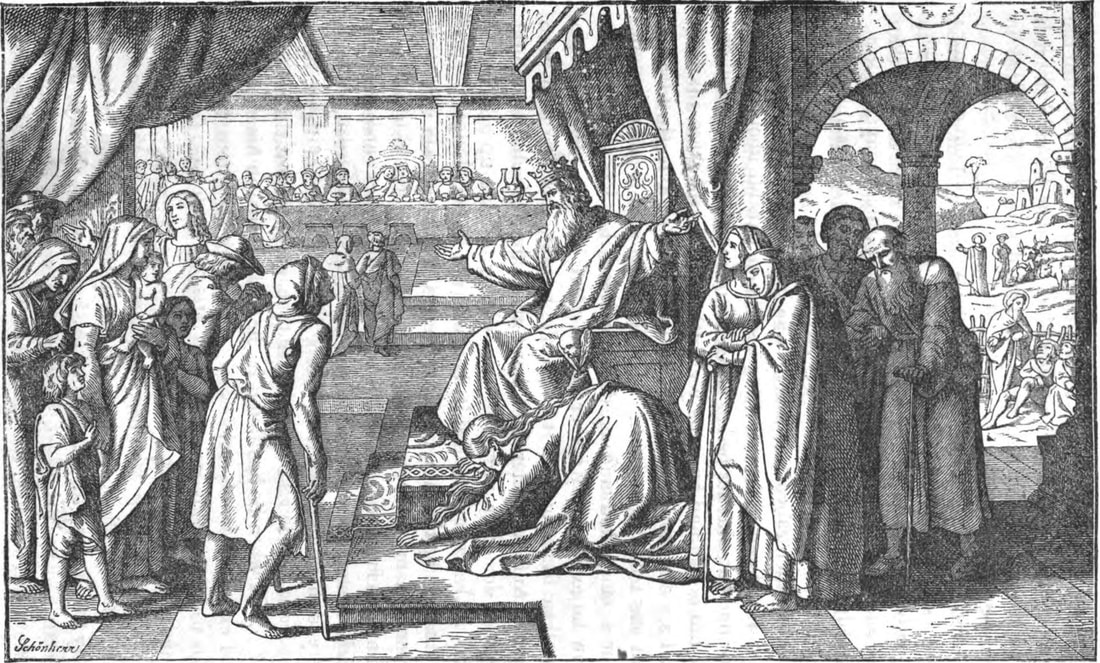Luke 14:12-24
Pastor James Preus
Trinity Lutheran Church
June 9, 2024
The Prophet Isaiah prophesied in chapter 25, “On this mountain the LORD of hosts will make for all peoples a feast of rich food, a feast of well-aged wine, of rich food full of marrow, of aged wine well refined. And He will swallow up on this mountain the covering that is cast over all peoples, the veil that is spread over all nations. He will swallow up death forever; and the Lord God will wipe away tears from all faces, and the reproach of His people He will take away from all the earth, for the LORD has spoken.” (Isaiah 25:6-8)
Is that a feast you would like to attend? One prepared by God Himself that swallows up death forever, takes away all your sadness, and removes the reproach of your sin from your conscience? Is that a banquet you would pass up? This is exactly the feast those invited to the banquet refused, when they made excuses saying they needed to see to land, oxen, and wife. Jesus told this parable for us, lest we choose temporary goods, which will fade away at the loss of the eternal goods Christ offers us! The three excuses we heard in Jesus’ parable to not come to the banquet, do we not give similar excuses to not dine with Christ in church each Sunday? “I have work to do.” “I just bought a new car or a new boat or a new tool, and I need to test them out.” “My homelife is busy. The kids have soccer, baseball, and dance” or “Sunday is the only day the wife and I have off to just relax.” Our excuses to refuse Jesus’ invitation are as ridiculous as the excuses made by the men in Jesus’ parable.
But this is the condition of our human race. We pine after that which perishes, and we ignore that which gives eternal life. Yet, we must remember Jesus’ words, “What profits it a man, if he gains the whole world, but forfeits his soul.” (Matthew 16:26) But Jesus offers us a feast that gives eternal life. Jesus told the Samaritan woman at the well, “Whoever drinks of the water that I will give him will never be thirsty. The water that I will give him will become in him a spring of water welling up to eternal life.” (John 4:14) Again, He said to the Jews in John 6, “Do not labor for the food that perishes, but for the food that endures to eternal life, which the Son of Man will give to you. …” and “I am the bread of life; whoever comes to Me shall not hunger, and whoever believes in Me shall never thirst. …” and again, “I am the living bread that came down from heaven. If anyone eats of this bread, he will live forever. And the bread that I will give for the life of the world is My flesh. …” and again, “Truly, truly, I say to you, unless you eat the flesh of the Son of Man and drink His blood, you have no life in you. Whoever feeds on My flesh and drinks My blood has eternal life, and I will raise him up on the last day.” (John 6:27, 35, 48, 53-54)
This is the banquet, which Jesus speaks about in His parable for today. This is the feast, of which Isaiah prophesied. And this is the same banquet to which you are invited today. Well, how can this be? How was this feast prepared? And how is this feast given?
This feast was prepared by God sending His only begotten Son to take on our human nature, and as a blameless offering, suffer and die as a sacrifice for our sins. As a fire roasts a lamb on a spit, so the fires of hell roasted our Redeemer Jesus as He made atonement for us on the cross. The hot wrath of God against all our sins was poured upon Him, and He bore it all. Being an innocent man, He deserved none of the suffering He endured. And being true God perfectly united in one person with the man on the cross, His suffering and death forever weighs the scales of divine justice in our favor. Christ Jesus has paid for the sins of the whole world. And now, He offers Himself to us as our host and meal. Everything is now prepared and ready for you.
But, how is this feast given? “Whoever comes to Me will never hunger, and whoever believes in Me will never thirst.” “Faith comes by hearing, and hearing through the words of Christ.” (Romans 10:17) Christ gives us His flesh and blood to eat and to drink through His Word and Sacraments. When we hear the Gospel and believe it, we feast at the feast of salvation, with Abraham the man of faith and all the company of heaven, and we receive victory over sin, death, and hell. In the Sacrament of the Altar, we consume the very body and blood of Him, who died for our sins and rose again imperishable. Don’t ask how this can be. As God is joined to man on the cross, so man is joined to God in the Sacrament. Christ’s human body can be present in ways we cannot comprehend. In the Sacrament we receive forgiveness of sins and strength to endure life’s trials. In the Sacrament we commune with the entire Christian Church, being united to the body of Christ. This means, we commune with the saints in heaven, our dearly departed, who departed this life trusting in Christ.
We go to church every Sunday, not simply because the Third Commandment forbids us to despise God’s preaching and Word, but commands that we hold it sacred, and gladly hear and learn it. We go to church every Sunday to taste the foretaste of the heavenly banquet, and to gain strength to get there! It is a lie from the foulest depths of hell that Christians do not need to go to church to be Christians. To go to church means to go and hear the Gospel, to feast on Christ in faith. To go to church means to accept the invitation to the heavenly banquet, it means to feast on that banquet even now in faith. And when the faithful are physically incapable of getting to this banquet in church, the church makes sure to bring the banquet to them. So, the pastors visit their sick and shut-in parishioners, to preach the Gospel to them, to feed them the Sacrament of Christ’s body and blood, and to pray for them.
The feast we receive in the Divine Service cannot be extolled enough. For water, Christ gives us the Holy Spirit to drink, to enliven our souls in faith toward God (John 7:37-39). The Holy Spirit comes to us through hearing Christ’s Word with faith (Galatians 3:2). For wine, Jesus gives us His very blood, which does not gladden our hearts as alcohol does by dulling the senses, but gladdens our hearts through the forgiveness of sins and a clear conscience. For food, He gives us His own body and flesh, which grants strengthening of faith and immortality to those who receive it in faith. And it is in the strength of this feast that we sojourn in this world of death, continuing to feed on Christ through faith as we meditate on His Word in daily devotions and prayer and sharing His comfort with one another as we forgive those who sin against us and receive forgiveness from our Christian friends.
Yet, take note. This banquet was prepared for us by Christ’s incarnation and innocent sufferings and death. This banquet is given to us through the preaching of Christ’s Word and Sacrament. Yet, this banquet cannot be received except through faith alone. Even if you go to church every Sunday, if you do not believe, then it is like sitting at the table and refusing to eat what is on your plate. “The fear of the LORD is the beginning of wisdom; and knowledge of the Holy One is understanding.” (Proverbs 9:10) Solomon is speaking of faith, which is the only way you can eat the feast the LORD provides for your eternal benefit.
Why does the master tell his servant to gather in the poor, crippled, blind, and lame? He is describing the faithful, who value the feast of eternal life over the temporary goods of this life. The poor are the poor in spirit, to whom Jesus says belongs the kingdom of heaven (Matthew 5:3). The poor in spirit may not be physically poor, but they do not consider their riches on earth as anything, but store up their treasure in heaven, trusting in Christ’s eternal promises. The crippled, blind, and lame are those who repent of their pride, love of money, and their trust in themselves and their temporal goods, and confess to be helpless before God. Jesus speaks of them in Matthew’s Gospel, “If your hand or your foot causes you to sin, cut it off and thrown it away. It is better for you to enter life crippled or lame than with two hands or two feet to be throne into the eternal fire. And if your eye causes you to sin, tear it out and throw it away. It is better for you to enter life with one eye than with two eyes to be throne into the hell of fire.” (Matthew 18:8-9) Now, with these words, Jesus does not mean that we should mutilate ourselves for the kingdom of God, but rather, we should cut anything out of our life that would prevent us from attending that heavenly banquet. So, it would be better to lose that field and those oxen than to keep them, but lose your seat at the feast of salvation.
But what about the man’s wife? Should you even be willing to lose your husband or wife for the sake of this banquet? Absolutely! Jesus says immediately after this parable, “If anyone comes to Me and does not hate his own father and mother and wife and children and brothers and sisters, yes, and even his own life, he cannot be My disciple.” (Luke 14:26) Now, Jesus does not mean that you should literally hate your own family. Rather, He uses a figure of speech to emphasize that you should love Him more than any other relationship. If your husband or wife will not go to the banquet with you, go without them. Yet, the best way to love your parents, spouse, children, or siblings is by encouraging them to partake of this banquet, because it is offered to them as well. But those, who try to keep their family at the loss of the heavenly banquet will learn that they lose both.
The proverb warns, “Whoever corrects a scoffer gets himself abuse, and he who reproves a wicked man incurs injury. Do not reprove a scoffer, or he will hate you; reprove a wise man, and he will love you.” (Prov. 9:7-8) And so, those who refuse the heavenly banquet get angry at those who invite them (Matthew 22:6). And those who are reproved for not going to church or who are instructed that it is a sin to refuse to hear God’s preaching, resent those who reprove and instruct. They do this because they do not know how much they need this banquet, that they are indeed poor, blind, and lame. Jesus speaks of this in Revelation 3, “So, because you are lukewarm, and neither hot nor cold, I will spit you out of My mouth. For you say, I am rich, I have prospered, and I need nothing, not realizing that you are wretched, pitiable, poor, blind, and naked.” (Rev. 3:16-17) Of those who do not see their need for the banquet and refuse the feast of salvation for the sake of temporal goods, Jesus says, “None of them shall taste my banquet.” (Luke 14:24)
Yet, for those who recognize their need and feast at this banquet through hearing with faith, they will enter the heavenly banquet and be fully satisfied. “They shall hunger no more, neither thirst anymore; the sun shall not strike them, nor any scorching heat. For the Lamb in the midst of the throne will be their shepherd, and He will guide them to springs of living water, and God will wipe away every tear from their eyes.” (Rev. 7:16-17) May God grant that we recognize our poverty, infirmity, and blindness, so that we urge ourselves to feast at this banquet in faith, so that we may feast at it in eternity. Amen.



 RSS Feed
RSS Feed